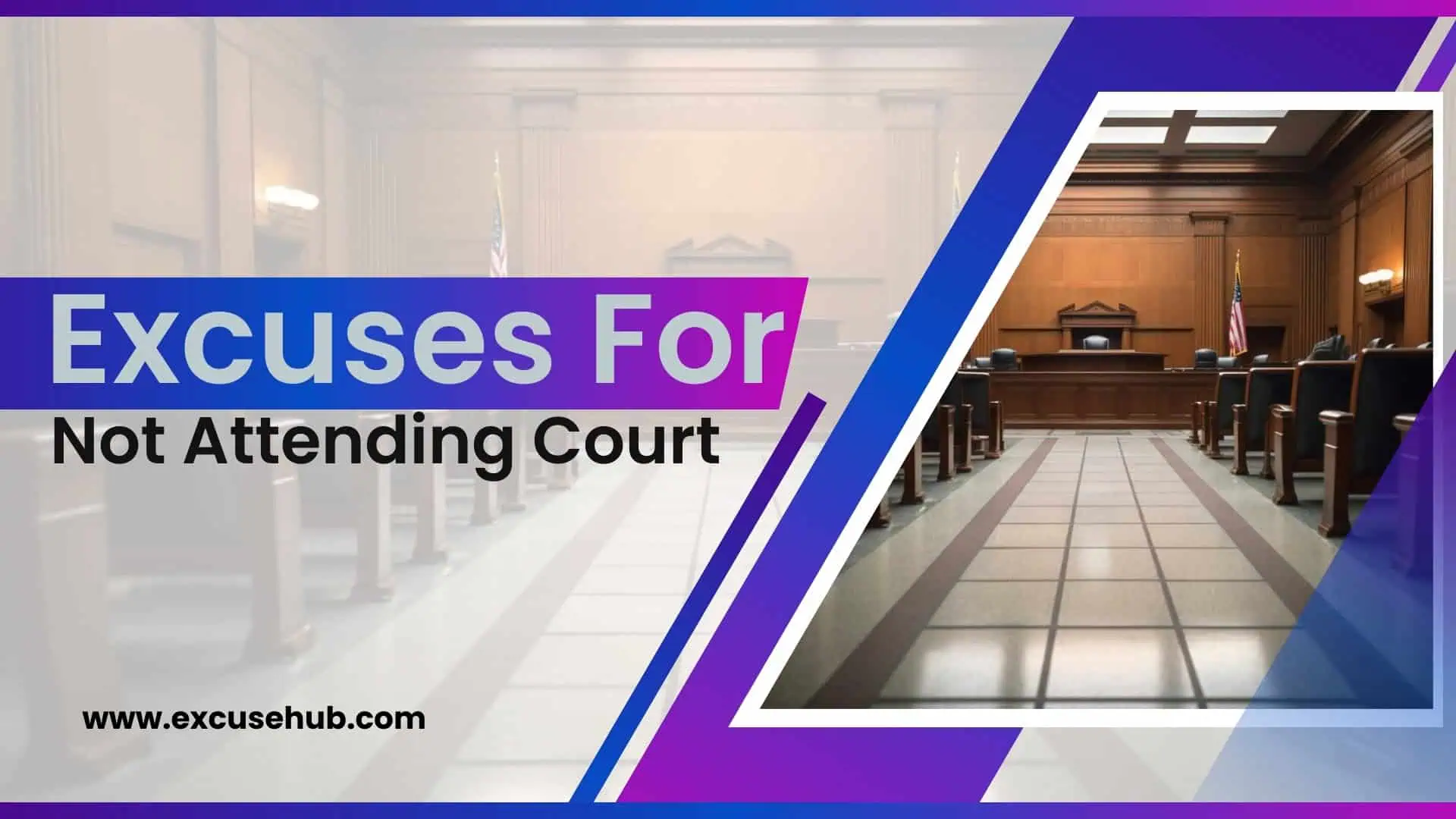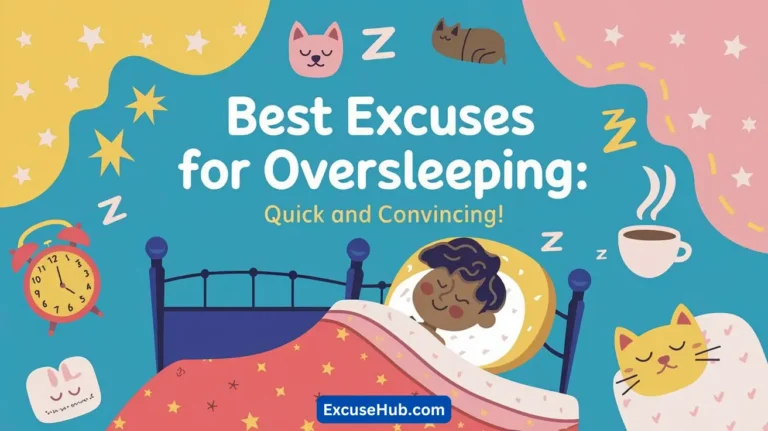Believable Excuses for Not Attending Court
Certainly, you’ve woken up on the wrong side of the bed, only to realize it’s the day of your court appearance—but fear not, the dog eating your summons isn’t the only excuse out there.
In your journey through the legal labyrinth, it’s paramount to differentiate the wheat from the chaff when it comes to plausible excuses for Not Attending court.
From genuine emergencies to procedural mishaps, understanding what the court might actually accept can save you from further complications.
Why does this matter, you ask? Stick around to uncover the nuances that could very well dictate your next steps in traversing the legal system.
Unacceptable Excuses for attending Court
Although many believe their reasons are valid, going to work or school doesn’t excuse you from attending court.
It’s important to understand that the law requires your presence at your court date, regardless of your personal or professional commitments.
When you miss court, it’s not just about the missed day; it’s about the respect for the judicial process. Many excuses for failure to appear, such as forgetting your court date or minor illnesses, won’t hold up in the eyes of the law.
However, there are very few valid reasons that may excuse you from attending. It’s important to communicate with the court if you believe you have such a reason.
Statements that prevent you from court
Understanding the gravity of missing a court date, it’s equally important to recognize what statements or reasons can legitimately prevent you from attending court.
A significant excuse often hinges on unforeseen circumstances that are beyond your control, such as a health or family emergency. Should you find yourself in such a predicament, documented proof of the emergency will be pivotal in substantiating your claim.
Another acceptable reason could be if you weren’t properly notified of your court date due to a court error. This situation underscores the importance of ensuring that the court has your current address to avoid such miscommunications.
It’s imperative to communicate these valid reasons to the court as promptly as possible. By doing so, you demonstrate respect for the judicial process and increase the likelihood of receiving a favorable response to reschedule your court appearance.
Reasons to Fail to Appear in Court
Understanding the valid reasons for failing to appear in court can save you from severe legal consequences.
If you weren’t notified of your hearing, your lawyer has withdrawn, or you’re facing last-minute emergencies, these situations may be considered by the court under specific circumstances.
It’s important to provide documented proof and communicate with the court as soon as possible to address these issues professionally.
You Were Not Notified of Your Hearing
If you didn’t receive notification of your court hearing, it may constitute a valid excuse for failing to appear in court.
It’s crucial to understand that the court must notify you within a reasonable amount of time, and any failure on their part, such as a court error, could be grounds to reschedule your court date.
However, the responsibility also lies with you to make sure your contact information is updated.
- Court Error: Documented proof of court mishandling can support your claim.
- Update Your Address: Prevent missing notifications by keeping your address current.
- Health or Family Emergency: Valid only if it prevented you from receiving the notification, not as a general excuse for missing court.
Your Lawyer Has Withdrawn
The sudden withdrawal of your attorney can greatly disrupt your ability to appear in court as scheduled. This unexpected event constitutes a valid excuse for failing to make your court appearance, provided you act swiftly and responsibly.
Immediate steps should include seeking to reschedule your hearing to secure new legal representation, ensuring minimal disruption to the legal process.
It’s imperative to provide the court with documented proof of the lawyer withdrawal, demonstrating your commitment to compliance and the serious nature of the situation.
Last-Minute Emergencies
Following the unexpected withdrawal of your attorney, it’s equally important to ponder how last-minute emergencies can impact your ability to appear in court as scheduled.
These emergencies must be valid and verifiable, not only to avoid a bench warrant but also to maintain the integrity of your case.
- Health Emergency: A sudden, significant health crisis requiring immediate attention can be an important excuse. Documentation is essential.
- Family Crisis: Situations such as a death in the family or an urgent care issue for a dependent may warrant a reschedule.
- Natural Disasters: Events like floods or earthquakes, disrupting travel or safety, can be considered significant reasons.
In any emergency, promptly notifying the court and providing documentation is important to reschedule your date without violating bail conditions or risking a failure to appear.
What Are Valid Reasons to Reschedule a Court Date?
Exploring the legal system, you’ll find that courts typically allow rescheduling for a limited number of valid reasons, including unforeseen health or family emergencies, not being properly notified of your hearing, and sudden withdrawal of legal counsel.
When facing a health emergency or a major family crisis, providing documented proof can support your request to reschedule your court hearing.
These are considered valid excuses as they directly impact your ability to attend. Similarly, if you’ve experienced a notification error, such as not receiving timely information due to court oversight, this can justify a rescheduling request.
It’s critical to demonstrate that you weren’t properly informed of your hearing to avoid penalties for non-appearance. Moreover, the sudden withdrawal of your lawyer can significantly affect your representation in court.
Reasons for Non-Appearance in Court
Often, individuals fail to appear in court due to various reasons, some of which may not be acceptable under legal standards.
If you miss a court date, it’s important to assess whether your reason constitutes a valid excuse. Understanding what the court deems a ‘good cause’ for failure to appear can help you steer potential legal issues more effectively.
- Contact the court immediately: If you realize you’re going to miss or have missed your court date, it’s imperative to contact the court as soon as possible. This proactive step shows your willingness to rectify the situation and may mitigate the consequences.
- Consult with a legal professional: Before you decide on a course of action, consulting with a legal professional can provide you with tailored advice on how to proceed based on your specific circumstances.
- Provide documentation for excuses: If you have a valid excuse for missing court, such as a health or family emergency, providing documented evidence can strengthen your case for a rescheduled hearing.
Remember, excuses for missing court must meet the court’s standards for good cause to avoid further complications, such as the issuance of a bench warrant.
Court’s Response On Failure to Appear Cases
When you fail to appear in court, the judicial system typically responds with stringent measures, including the possibility of issuing a bench warrant for your arrest.
This action isn’t taken lightly; it signifies a serious escalation in your case. A bench warrant grants law enforcement the authority to locate and detain you, potentially leading to your arrest at any time or place.
This can occur during routine traffic stops or through direct police action aimed at bringing you into custody.
What is Considered a Valid Excuse for Missing a Court Date
Understanding which excuses the court deems valid for missing a court date is important, as failure to appear can lead to severe legal repercussions.
It’s critical to know what constitutes a valid excuse to avoid these outcomes.
Valid excuses for not attending court generally fall into a few categories, each with its own set of criteria:
- Severe Illness or Hospitalization: Not just any sickness will do. Your illness must be significant enough to render you unable to attend, backed by medical documentation.
- Family Emergencies: These must be serious, immediate family crises that require your presence, such as a death in the family. Documentation may be required.
- Not Being Properly Notified of the Court Date: If the court failed to notify you in a reasonable manner or time frame, this could be considered a valid excuse.
If you find yourself needing to reschedule your court date due to a valid excuse, it’s imperative to act promptly and communicate effectively with the court to minimize legal repercussions.
Conclusion
In the grand theater of the courtroom, where justice is the star, your absence is more than a mere empty seat—it’s a glaring spotlight on your disregard for the legal process.
Remember, the court isn’t swayed by tales of forgotten dates or busy schedules. Only the most compelling, life-altering reasons—think cataclysmic health emergencies or monumental legal mishaps—will suffice.







